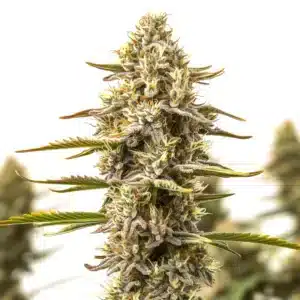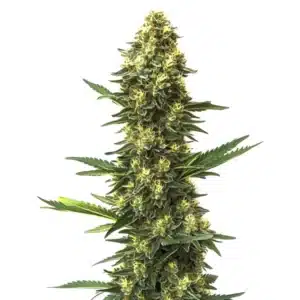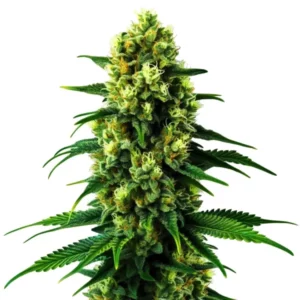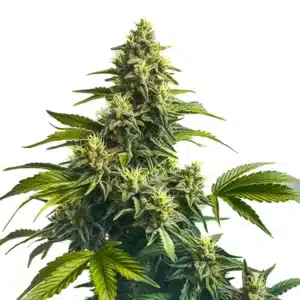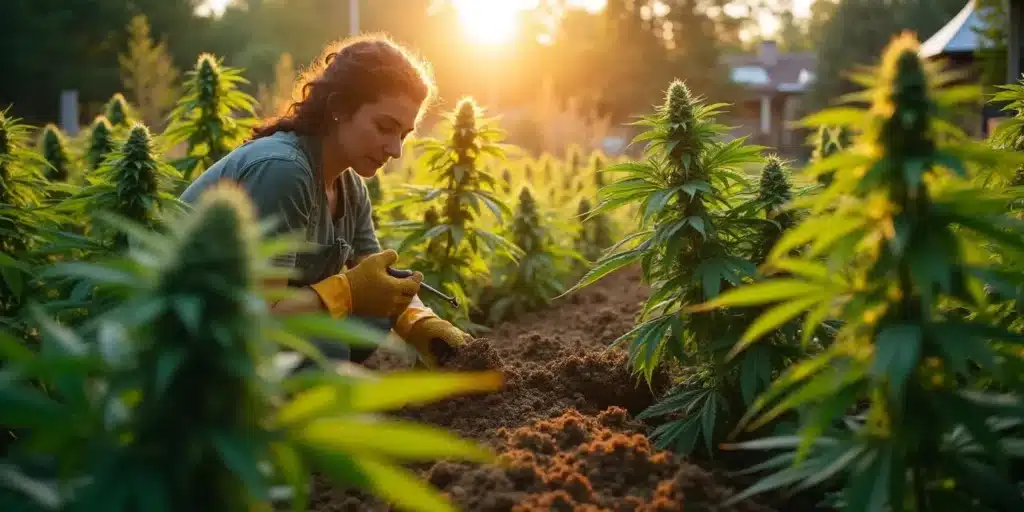
Best Nutrients for Outdoor Cannabis Plants
Growing cannabis outdoors can be a fulfilling journey, especially when you understand how to nourish your plants with the right nutrients. The vitality of your cannabis plants is closely linked to their nutrient intake, which heavily influences their growth, yield, and overall quality. In this guide, we’ll explore the best nutrients for outdoor weed plants, helping you cultivate healthy and productive plants this growing season.
Key Nutrient Types for Cannabis Growth
Nutrients are essential for the various stages of cannabis growth. They fall into two primary categories: macronutrients and micronutrients. Each type plays a distinct role in fostering plant development and achieving optimal health.
Recommended Strains
Glookies
|
|
THC | 22% - 25% (Medium) |
|
|
Type | Feminized |
|
|
Yield | High |
|
|
Phenotype | 70% Indica / 30% Sativa |
Glookies Autoflower HMC Edition
|
|
THC | 22% - 25% (Medium) |
|
|
Type | Autoflowering |
|
|
Yield | High |
|
|
Phenotype | 70% Indica / 30% Sativa |
Macronutrients
Macronutrients are required in larger amounts and include nitrogen (N), phosphorus (P), and potassium (K), commonly referred to as NPK. Each of these macronutrients has specific roles to play:
- Nitrogen: Vital for leaf development and overall vegetative growth, nitrogen helps form chlorophyll, the green compound necessary for photosynthesis.
- Phosphorus: Essential for root development and flowering, phosphorus aids in energy transfer within the plant and influences fruit production.
- Potassium: Crucial for overall plant health, potassium helps improve disease resistance and enhances the taste of the final product.
Knowing when to apply the best nutrients for outdoor weed plants can significantly impact your crop. For instance, a higher nitrogen formula is recommended during the vegetative stage, while phosphorus and potassium should be prioritized during flowering to maximize bud production.
Understanding the right timing for nutrient supply can also enhance your gardening success. As the seasons change, so do the nutrient requirements of your plants. Keeping a close eye on your plants and adjusting their nutrient intake accordingly will set you up for success.
Micronutrients
Although micronutrients are needed in smaller quantities, they are critical for a plant’s proper functioning. Key micronutrients include iron, manganese, boron, and zinc. Each of these supports different aspects of plant health:
- Iron: Crucial for chlorophyll synthesis, iron facilitates effective photosynthesis, the process through which plants convert sunlight into energy.
- Manganese: Important for enzyme function and the process of photosynthesis, manganese helps improve metabolic efficiency.
- Boron: Essential for plant tissue development and reproduction, boron aids in the production of flowers and seeds.
Neglecting micronutrient levels can lead to deficiencies indicated by symptoms such as leaf discoloration and growth anomalies. Observing your plants closely can help you catch these issues early and make the right adjustments.
Promos & Deals
Best Organic Nutrients to Consider
For outdoor growers, organic nutrients present a natural way to nourish plants without harsh chemicals. They improve soil conditions while providing necessary nutrients. Here are some top organic options to consider:
Compost
Compost acts as a powerhouse of organic nutrients and is considered one of the best nutrients for outdoor weed plants. It enriches your soil with a blend of macro and micronutrients, improving soil structure and moisture retention. By incorporating compost into your planting area regularly, you can cultivate robust plant health.
Additionally, composting allows you to recycle kitchen scraps and yard waste, turning organic material into a valuable resource. This sustainable practice not only nourishes your plants but also benefits the environment.
Worm Castings
Worm castings offer an exceptionally rich source of organic nutrients filled with beneficial microorganisms. They help enhance nutrient absorption and are abundant in nitrogen. By blending worm castings into your soil mix, you can boost plant growth and increase your yield.
Moreover, using worm castings can enhance the microbial life in your soil, promoting a healthier ecosystem. This natural fertilizer is not only effective but also easy to apply, making it a favorite among many growers.
Fish Emulsion
Fish emulsion is yet another excellent organic nutrient source, brimming with nitrogen and trace elements. It fosters strong plant growth and is especially helpful during the vegetative phase due to its quick absorption by roots.
Growers often prefer fish emulsion for its effectiveness and ease of use. Applying it in diluted form will ensure your plants receive the nourishment they need without overwhelming them.
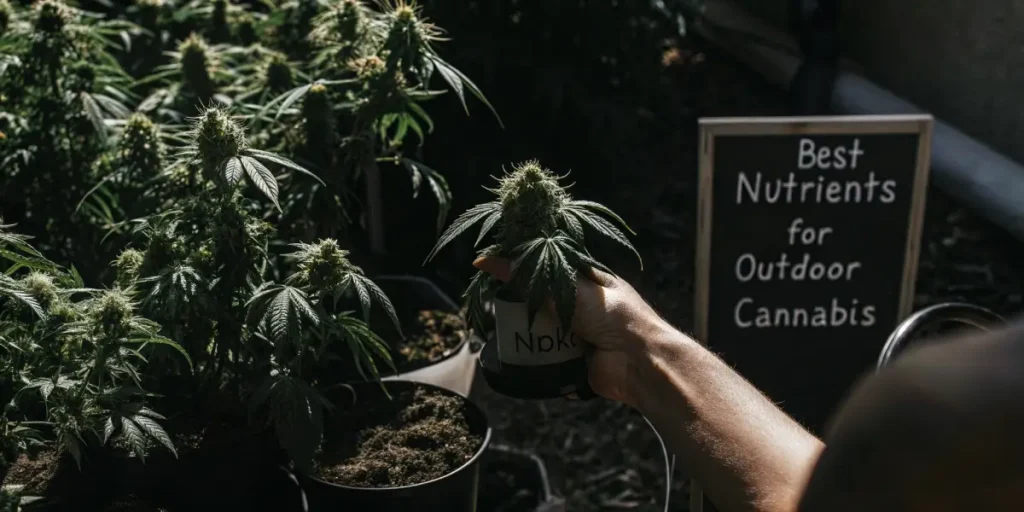
Enhancing Soil Health
While nutrients are a key aspect of plant growth, healthy soil is crucial for making those nutrients accessible. Focusing on soil health can greatly enhance nutrient uptake and lead to stronger plants. Here are some practices to maintain soil vitality:
Regular Soil Testing
Conducting regular soil tests allows you to assess the nutrient content and pH levels of your soil. Knowing your soil’s pH is vital, as it affects nutrient availability. Ideally, cannabis soil pH should range between 6.0 and 7.0. Using the best nutrients for outdoor weed plants ensures optimal growth and helps maintain proper pH levels. Adjustments can be easily made by adding lime or sulfur as needed.
By testing your soil periodically, you can ensure that your plants receive the balanced nutrients they require at every growth stage. This proactive approach can prevent many common growth problems down the line.
Mulching
Applying a layer of mulch helps with moisture retention and weed suppression. Using organic materials such as straw or wood chips not only enriches the soil over time but also creates a beneficial environment for soil organisms. These practices contribute to achieving the best soil texture for plant growth. It’s a two-fold benefit—you’re protecting your plants while improving soil quality.
Moreover, mulching can improve the microclimate around your plants, keeping soil temperatures consistent and reducing evaporation. This simple practice can make a significant difference in your gardening success.
Crop Rotation
Practicing crop rotation contributes significantly to soil health. Different plants have distinct nutrient requirements, and rotating crops prevents nutrient depletion. Additionally, crop rotation helps to maintain a balanced ecosystem in your garden and minimizes pest and disease issues.
Rotating your plants yearly can also invigorate the soil by breaking disease cycles and improving soil structure. Together, these practices contribute to long-term gardening success and environmentally friendly agriculture.
Watering and Nutrient Delivery
Proper watering techniques are crucial for ensuring that nutrients are efficiently delivered to your plants. Both over-watering and under-watering can lead to problems such as nutrient lockout or deficiencies:
Watering Practices
A best practice is to water when the top inch of soil feels dry. Instead of opting for frequent shallow watering, deep watering encourages robust root development. Don’t forget about drainage; good drainage minimizes the risk of root rot. Adding materials like perlite or sand can vastly improve soil structure and drainage capabilities. Pairing proper watering techniques with the best nutrients for outdoor weed plants ensures healthier growth and higher yields.
Be sure to adjust your watering schedule based on weather conditions and the specific needs of your plants. Paying attention to the climate can help you gauge when and how much to water.
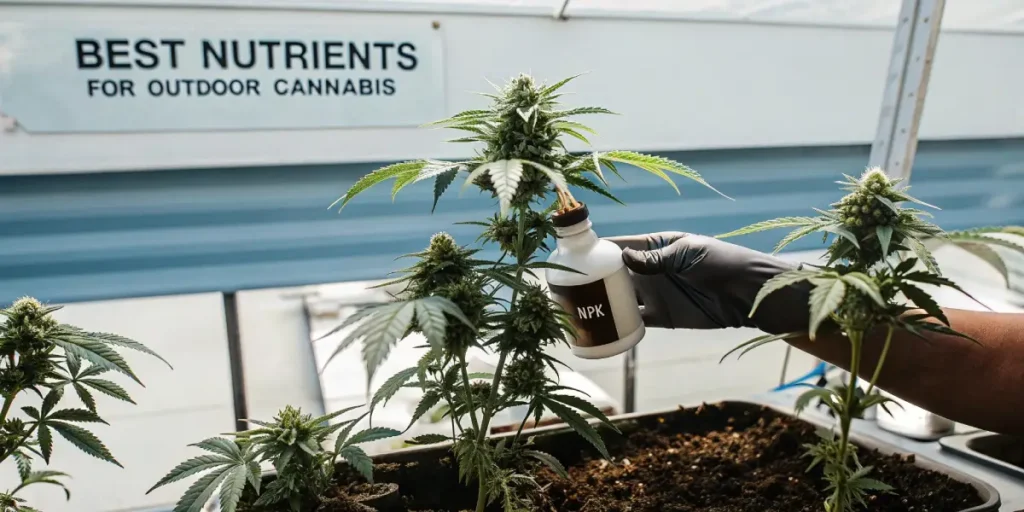
Nutrient Application Timing
Timing nutrient application is especially crucial for outdoor plants. During the early growth stage, plants typically need less nutrition, but as they transition to flowering, their nutrient demands will increase significantly. Observing your plant’s growth habits will provide useful clues for adjusting their feeding schedule.
Consider using timed feeding schedules that correspond with plant development stages. Adjusting your fertilizer routine based on growth observations can lead to healthier and more productive plants.
Choosing the Right Products
When selecting nutrients for your outdoor cannabis plants, it’s important to weigh both organic and synthetic options. Some growers lean towards organic nutrients for their environmental advantages, while others appreciate the speed and effectiveness of synthetic fertilizers.
Recommended Nutrient Brands
Several reputable brands offer exceptional products tailored specifically for cannabis cultivation. Here are a few to consider:
- Fox Farm: Renowned for their diverse range of nutrient solutions designed for various growth phases.
- General Hydroponics: This brand provides both organic and synthetic options, catering to a variety of growing preferences.
- Canna: Exclusively focused on cannabis products, Canna offers specialized nutrients aimed at maximizing results.
Reading customer reviews and seeking suggestions from fellow cannabis growers can help you make informed choices that meet your unique growing goals.
Tips for Nutrient Management
Effectively managing nutrients involves a continuous process of observation and adjustment. Being aware of the signs your plants exhibit can guide you in fine-tuning their nutrient requirements.
Monitor Plant Health
Regularly examine your plants for signs of nutrient deficiency or excess. For example, yellowing leaves may suggest nitrogen deficiency, while burnt leaf tips could signal nutrient overload. Using the best nutrients for outdoor cannabis can help maintain a proper balance and prevent these issues. Responding promptly can help prevent more serious health problems within your plants.
Maintaining a close watch on your plants’ well-being can also give you insights into their growth patterns and needs, leading to improved outcomes in your gardening efforts.
Stay Informed
Joining online forums and local grower groups can enrich your knowledge by providing practical experiences and insights from others. Staying updated with the latest cultivation techniques and nutrient management practices can considerably enhance your growing skills.
Don’t hesitate to share your own experiences and tips as well; contributing to the community not only solidifies your learning but also builds a network of valuable resources.
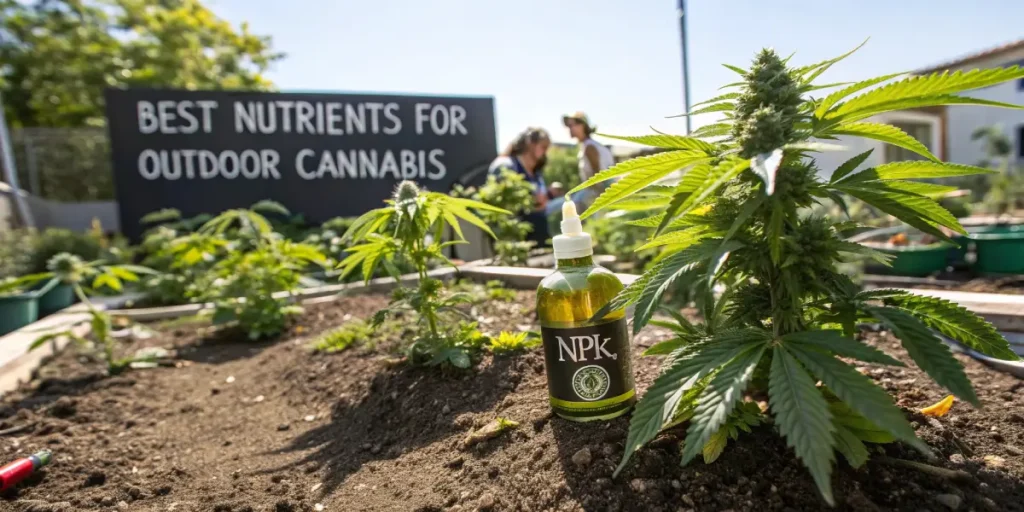
FAQs About Best nutrients for outdoor weed plants
What signs indicate a nutrient deficiency in cannabis plants?
Common indicators of nutrient deficiencies include yellowing leaves, stunted growth, or browning leaf tips. Each nutrient deficiency manifests through specific symptoms, so becoming familiar with these signs can facilitate early diagnosis and intervention.
How often should I fertilize my outdoor cannabis plants?
The frequency of fertilization usually hinges on the growth stage of the plants. In general, those in the vegetative stage benefit from more frequent feeding compared to those in the flowering stage. A good starting point is to fertilize every two to three weeks during active growth.
Can I use regular garden soil for cannabis growth?
While regular garden soil may work, it’s advantageous to amend it with organic materials like compost or worm castings. These additions enrich the soil and create a better environment for cannabis development, ultimately leading to healthier plants.
Should I use bottled nutrients or organic options?
This decision often comes down to personal preference. Organic nutrients are generally gentler on the environment and promote a healthy microbial ecosystem in the soil, while synthetic options can offer faster results. Consider your growing style and the outcomes you desire when making your selection.
What are some popular cannabis strains for outdoor growing?
Consider these strains for your outdoor garden:
- Amnesia Lemon: Renowned for its resilience and impressive yield.
- Northern Lights: A classic strain that flourishes outdoors, noted for its wonderful aroma and flavor.
- Super Skunk: Known for its strong scent and robust growth, making it a favorite among outdoor cultivators.




